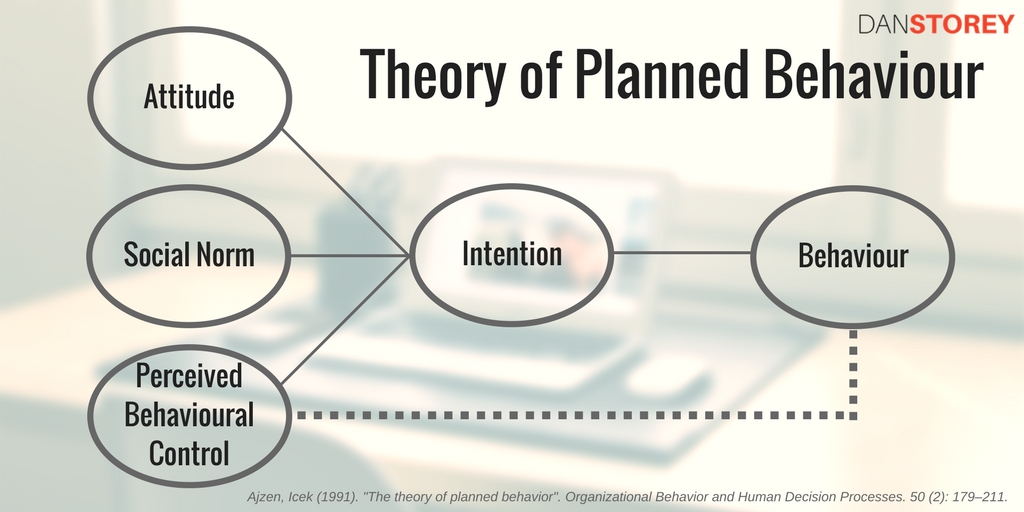Why New Year’s Resolutions Fail
At the beginning of every year, people set New Year’s Resolutions, only to have them fail a few weeks later. In fact, recent statistics suggest that only 9.2% of people feel successful in achieving their resolutions each year.
The reason why New Year’s Resolutions fail is not due to lack of enthusiasm or passion. If that was all it took to achieve something, we would all hit all of our goals.
Instead, the real reason people don’t follow through with their resolutions comes down to a lack of understanding of behaviour change.
In fact, there are 5 main reasons why New Year’s Resolutions fail to work, and some simple steps we can take to fix this.
Before we get into those 5 reasons, let’s take a moment to understand a little more about behaviour change.
Theory of Planned Behaviour
One of the best models for New Year’s Resolutions-style behaviours is the Theory of Planned Behaviour by Icek Ajzen.

In the Theory of Planned Behaviour, intentions (or goals) are built on a foundation of three elements:
– our attitudes around a behaviour
– our social network’s attitude to the behaviour
– our belief in our ability to succeed at a behaviour
We will tend to set goals that align with these three elements.
For example, if you have a positive view of health, none of your friends smoke and you feel strongly that you will be able to stop smoking, setting a goal to stop smoking should be easy.
However, if you have higher priorities than your health, know lots of people who smoke and have tried before and failed, even setting this same goal might not be so easy.
It is easier to set and achieve goals if all three of these elements are aligned in support of your goal.
The final thing to notice from this model is that goal setting is not the final step. In fact, there is a gap between intention and behaviour, and this gap is one of the big reasons why people fail with their New Year’s Resolutions. If we don’t take action and engage in the behaviour to make our intention a reality, we will never achieve our goals.
Understanding this model should give you an idea of the 5 main reasons why New Year’s Resolutions fail, but let’s go through them now.
No Strong Reason Why
If your attitude toward your goals are weak, there is a good chance your New Year’s Resolutions will fail.
Instead, get clear on why this is important to you.
Why must you achieve this goal? What will happen if you do? What will happen if you don’t?
How will life look in 1 year, 2 years or 10 years if you do or don’t succeed with this resolution? If life won’t be too different, then you won’t have very strong motivation to take action. But if you know that you can’t afford NOT to succeed, you’ll be energised and focused in the direction of your goal.
Often we find our reason why is actually related to other people.
Perhaps your fitness goal is so that you don’t embarrass your children at the school sports day?
Maybe the reason you want to travel is because you want to treat your parents after they sacrificed their travels when they were raising you?
The reason you want to create a successful business may be to pay for a better education for your children or to pay off your parents’ mortgage?
A compelling why will keep you on track. Find a way to remind yourself of why you have that New Year’s Resolution every time you feel your motivation dropping.
Weak Support Network
We often hear we are the average of the 5 people we spend most time with, and this certainly plays a part in it.
However, rather than just spending time around cool people, we need to have a close network of people who will hold us accountable to our goals.
If you are the most successful person you know, you are going to struggle to find external motivation and accountability for your new year’s resolution.
Instead, get people around you who care about your progress and will keep you focussed.
Want to get fit? Join the best gym in the area and tell the trainer not to take it easy on you.
Want to start a business? Join a weekly networking group and commit to go every week.
Want to buy a property? Sign up for mentoring from a property investment expert. If they don’t offer mentoring, be more persuasive!
You need people around you who will challenge you, push you and hold you accountable. If you didn’t have them before, you need to go out and find them. Don’t let a social circle be your reason why New Year’s Resolutions fail.

Lack Of Self Efficacy
Self efficacy acts on our goals in two ways.
Firstly, self efficacy is related to how challenging we make our goals. If we believe in ourself, we are more likely to set goals that are going to be more challenging and more rewarding.
Secondly, our self efficacy determines how likely we are to take action after setting our goals.
Self efficacy, which is a psychological construct originally created by Albert Bandura in 1977, is related to our belief in our ability to be successful with our goals.
The good news is we can increase our self efficacy in 4 different ways:
1. Performance Accomplishments
Break your goals down into smaller chunks and celebrate each accomplishment.
2. Vicarious Experience
Find a role model and observe them in action. Learn by watching and then apply those lessons to your own actions.
3. Verbal Persuasion
We all need encouragement, so find someone to tell you what you need to hear to believe in yourself. A life coach or mentor is a great way to strengthen this element.
4. Emotional Arousal
Watch an uplifting movie or listen to music that gets you in the zone before you need to take a significant step toward your goal. There are lots of ways to get into a more positive state, but these are two of the fastest.
You need to believe in yourself to achieve your goals, so train your self efficacy every day until you feel unstoppable.

Lack Of Compelling Goal
There is a difference between a to-do list and a set of compelling goals. Thankfully, otherwise everyone in the supermarket would be running around, high fiving everyone each time they ticked something off their list.
A compelling goal is something that gets you excited at the thought of achieving it. It should challenge you, stretch you and require you to develop your skills , knowledge or ability to make it become reality.
If you want to improve your finances, opening a savings account is a great first step. However, you can get that done in a few seconds, so then what. Opening a savings account is a to-do list item. Finding a way to match your salary with a side hustle is a compelling goal.
If you want to write a book, starting a blog gets you started in your writing practice, but you can set that up in a few minutes. Committing to write a book by the end of next month by writing and publishing a 2000 word article every day is a challenging and compelling goal.
The reason why many New Year’s Resolutions fail is because the goal is just not inspiring. If you want to succeed with your resolution, find a way to energise it and have it motivate you.

Lack Of Action
The only way to get your goal off the paper and into reality is through action.
First you need to get clear in your mind what your goal or resolution is, then you need to find a way to turn that dream into reality.
However, action can be scary. Remember, we are attempting to do something we haven’t succeeded at before. If we had, then this wouldn’t be a resolution as we would have already achieved it.
This is where having an action plan comes in. By breaking down your large goals into manageable chunks or action steps, we can start to make progress.
Just like building a snowman, it takes a lot of effort to get going. You start rolling around a small snowball and it seems like you are getting nowhere. However, before too long, that ball has grown and now every roll you make picks up more and more snow.
This is the same with your goals. Your early actions may seem small, but this is the time you are building momentum. After a while, with the knowledge and experience gained from taking so much action, you will find your progress toward your goal accelerates.
Action is not an optional step. You cannot will your goal into existence. You cannot use the law of attraction without acting upon the opportunities that present themselves to you.
Do something, anything, everyday. Do something big, something small… Any progress toward your goal, no matter how small, is a step closer to making your resolution a reality.
And before you think you can carry on as you did before, realise that the same behaviour you used to engage in is not going to create the results you are looking for. You need to do something different than usual. Step outside.your comfort zone and take the actions you know will move you in the right direction.
So there we have it. If you are setting your New Year’s Resolutions now, so now you know the reasons why New Year’s Resolutions fail, make sure to include these steps in your planning and check out my goal setting playbook for help in this process. And if you have already started your resolutions, make sure you adjust your activity to include these tips above.
Your New Year’s Resolutions are important to you. This time, give them the attention they deserve. Make this your last year of setting the same old resolutions. This year you will succeed beyond your imaginations, so get excited about next year’s New Year’s Resolutions already!





Leave A Comment